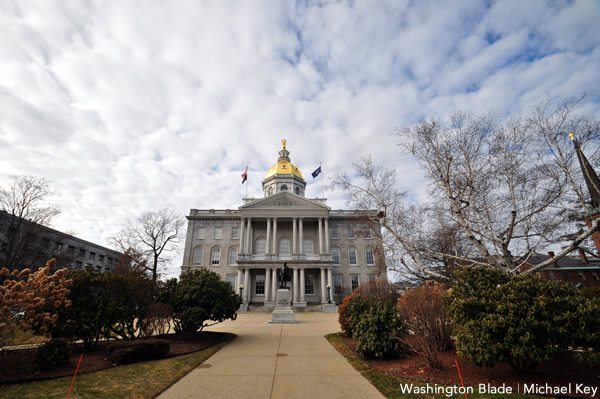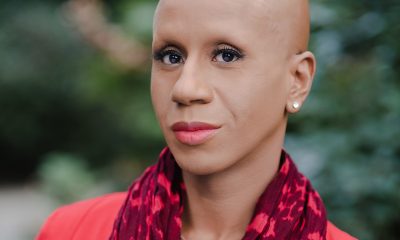National
Effort to repeal marriage equality fails in N.H.
A tense, sometimes surreal debate
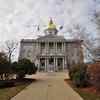
UPDATE: According to sources at national Log Cabin Republicans, the vote split by party in New Hampshire was 119 Republicans voting not to repeal, while 92 Democrats voted against repeal, leaving 13 Democrats not willing to go on the record in favor of preserving same-sex marriage.
An effort to overturn marriage equality in New Hampshire appears to be dead for the year after a Republican-controlled state House of Representatives failed to pass a repeal measure, despite desperate last-minute attempts to make the bill more palatable to moderates by author Rep. David Bates.
In a 211-116 vote, the legislature gave same-sex marriage advocates something to cheer about when, after hours of procedural efforts to keep the bill alive, enough GOP lawmakers voted against the bill to rescind the right to marry from New Hampshire residents.
Several Republicans crossed the aisle to defeat the measure, including Reps. Mike Ball and Jennifer Coffey, who spoke out against the bill last week along with other advocates and Democratic lawmakers at a news conference organized by the marriage equality group Standing Up For New Hampshire Families.
During a long and contentious debate on the bill in which the same amendment was brought back for reconsideration twice, strong statements were made on all sides of the issue.
“God is my judge, this legislative body is not my judge,” Rep. Cameron DeJong proclaimed. “Allow me to have this discussion between my God and me about my decisions.”
Rep. Ball compared the bill to segregation in the South, “Let’s put this dog down, like it deserves to be.”
In a surreal moment during the debate, an amendment to the bill was introduced to also bar marriage between left-handed people. That amendment failed to be considered.
House bill 437, which would have prevented New Hampshire from recognizing any new same-sex marriages and revived the 2007 civil unions law in its place, was introduced last year by GOP Rep. Bates, along with 11 Republican co-sponsors. After the bill lost traction in the House last week, Bates introduced an amendment that would put a nonbinding question on the issue before voters in November, prior to the law’s official repeal date in March 2013, as well as have left intact the 2,000 existing same-sex marriages already recognized by the state, much like California’s post-Proposition 8 law that created, what advocates call 15,000 “limited edition” legally recognized same-sex marriages in that state.
The floor amendment, meant to give the law a better chance of surviving a veto, failed to be adopted after a vote of 162-188, leaving the bill less likely to become law in the long run.
After a failed first vote on returning to civil unions, the legislature voted to divide the combined civil unions-referendum amendment into separate issues, an effort that also failed on a vote of 128 to 222.
During that debate, Rep. David Welch — who at one time opposed same-sex marriage, but is now a vocal opponent of the measure to repeal it on constitutional grounds — called on his colleagues to vote against the amendment containing the call for referendum and for reinstating civil unions. “The legislature has given rights to certain members of our community, and we should not vote to take them away.”
The veteran lawmaker repeatedly called into question the constitutionality of HB 437 throughout the debate.
Also opposing the amendment was Republican Rep. Shawn Jasper, who urged the legislature to drop the bill and send a clean binding referendum to the people, rather than the planned non-binding ballot measure.
He was followed by pro-gay Republican Rep. Jennifer Coffey, who called for an end to the push against committed same-sex couples, saying if a voter opposes same-sex marriage, they’re not obligated to enter into such a marriage.
“This body has set in motion a ping-pong ball with people’s lives,” Coffey told her colleagues.
Countering the call for a ballot initiative, Rep. Steve Murphy (R- Bedford) declared, “The rights of the people are not subject to popular vote.”
Earlier, the initial vote on the civil unions amendment — prior to the multiple votes to reconsider — failed on a vote of 82 to 266.
During the debate of the first civil unions amendment on the floor, Rep. Dan McGuire said he has three lesbians in his life, including his “mother and sister,” but supports the amendment that will end marriage because he supports the “dictionary definition” of marriage, and says that this is an issue of “extreme political correctness.”
Also speaking in favor of the civil unions amendment was Rep. Marilinda Garcia, who argued that allowing couples who have no biological ability to create children would weaken marriage for those that do have that ability.
The bill could still be revived in the overwhelmingly Republican-controlled Senate, where its fate would be in the hands of the handful of moderate Republicans.
New Hampshire Gov. John Lynch repeatedly vowed to veto House bill 437.
Recent polls show that respondents oppose ending same-sex marriage by up to 62 percent, however, no state electorate in the country has yet approved full marriage rights for same-sex couples via the ballot.
Five other states, and the District of Columbia, have extended marriage rights to same-sex couples, including Massachusetts, Connecticut, Iowa, Vermont, and New York. Maryland’s Governor Martin O’Malley signed into law a gender neutral marriage bill that will take effect on January 1, pending the result of a likely November ballot measure. Likewise, Washington Gov. Christine Gregoire signed into law a bill extending marriage rights to same-sex couples going into effect also pending a voter initiative. In addition, the New Jersey legislature passed a same-sex marriage law in February, but will need to override Gov. Chris Christie’s veto by the end of the legislative session in 2014.
New Hampshire became the fifth state in the nation to expand marriage rights to include same-sex couples, the third to do so without being compelled to by a court, and the second to pass through the legislature with a governor’s signature — current Gov. John Lynch — following Maine’s Gov. John Baldacci earlier that year. The marriage law went into effect in early 2010, and thousands of same-sex couples have taken advantage of the rights.
The White House
Jane Rigby awarded Presidential Medal of Freedom
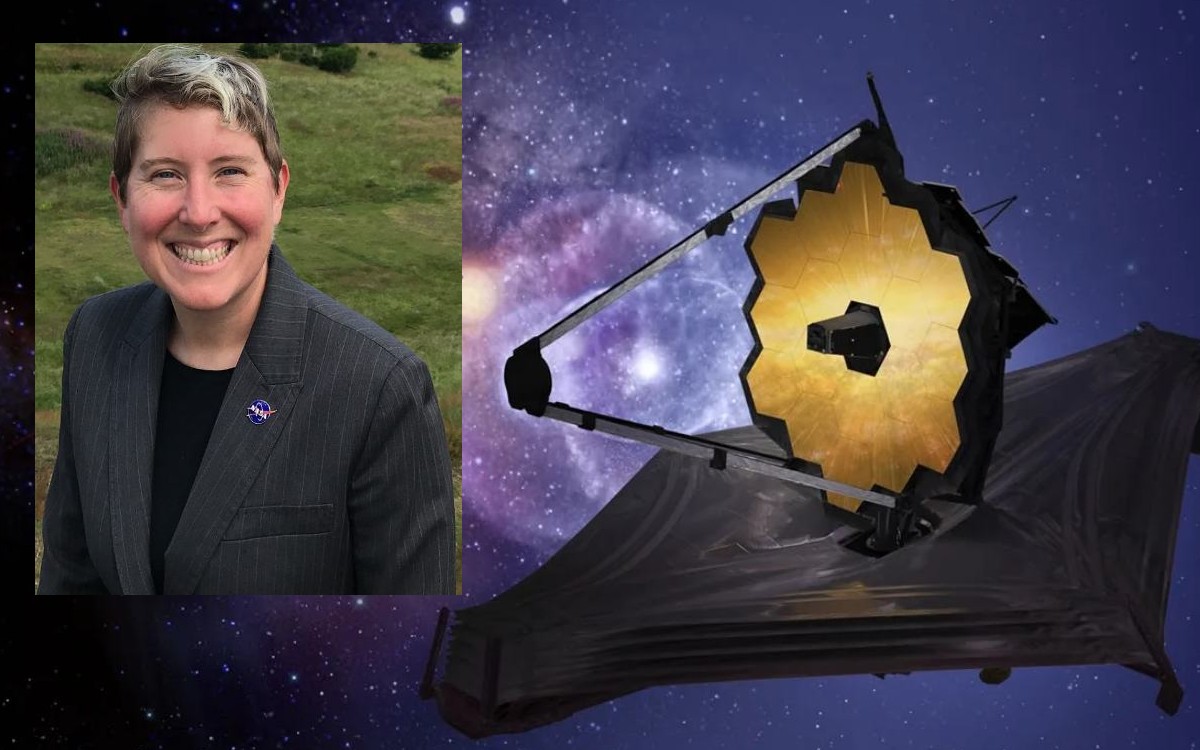
Sitting among a diverse and venerable group of Americans from every walk of life on the dais in the East Room of the White House on May 3 was lesbian and NASA astrophysicist Jane Rigby, awaiting her turn to be honored by President Joe Biden who would bestow the Presidential Medal of Freedom, the nation’s highest civilian honor, on her.
Rigby, an astronomer who grew up in Delaware, is the chief scientist of the world’s most powerful telescope who alongside her team operating NASA’s James Webb Space Telescope, studies every phase in the history of the universe, ranging from the first luminous glows after the Big Bang, to the formation of solar systems capable of supporting life on planets like Earth, to the evolution of the solar system.
A member of Penn State’s Class of 2000, Rigby graduated with a bachelor’s degrees in physics and astronomy. She also holds a master’s degree and a PhD in astronomy from at the University of Arizona. Her work as the senior project scientist for NASA’s Webb Telescope includes studies on how galaxies evolve over cosmic time and she has published more than 140 peer-reviewed scientific papers.
Rigby was named to Nature.com’s 2022 list of 10 individuals who shaped science and to the BBC’s list of 100 inspiring and influential women in the same year. Rigby had postdoctoral fellowships at Carnegie Observatories in Pasadena, Calif., before landing her job at Goddard Space Flight Center. In 2013 Rigby was awarded the Robert H. Goddard Award for Exceptional Achievement for Science.
A founding member of the American Astronomical Society’s Working Group on LGBTQ Equality in January 2012, now called the Committee for Sexual Orientation and Gender Minorities in Astronomy, Rigby serves as its Board Liaison until her term expires this June.
The lesbian astrophysicist in an interview for SGMA’s website spoke about her experiences including coming out:
“I’ve been out since 2000. My story’s simple — I fell in love with a fellow grad student in the department. It was a close-knit department, so hiding would have been ludicrous. Nor did I want to hide the best thing in my life! So, we were out as grad students. I certainly heard people say awful homophobic things at work there. They weren’t directed at me, and they weren’t said by people with power over me. If I recall, I was much less afraid of homophobic discrimination at work, than I was afraid of the two-body problem, and the lack of support we would receive as a same-sex couple in astronomy. That fear turned out to be justified. I’ve seen numerous different-sex couples get a wide range of support in solving the two-body problem, which was never offered to us,” she told the interviewer.
She reflected on American astronaut and physicist Sally Ride, her childhood role model who had an impact on her career:
“One of my biggest role models when I was young was Dr. Sally Ride. A few years ago, on her deathbed, Dr. Ride chose to write in her obituary that her life partner had been a woman. Dr. Ride was the most influential woman scientist when I was growing up — the person that made me say, “I want to do THAT when I grow up.” It was because of her that I realized that astrophysics was a profession, that physics was a subject girls could study, that NASA needed astrophysicists. So I’m so … amused, I suppose, that Sally Ride was this influence on my life’s path, at a time when I was completely unaware that it was even possible to *be gay* — and at the same time, she was gay, in love, and deeply closeted to keep her job.”
The interviewer noted that “for some women being gay is a cause for concern at the work place. Some say they were unsure about how to turn their sexual orientation into a positive aspect of their work persona.” Then asked Rigby what is your view on this?
“My experience is that absolutely I am a *better* astronomer because I’m queer. For a few reasons. First, I see things different than my colleagues. On mission work, as we weigh a decision, my first thought is always the community impact: ‘If we do things this way, who benefits, and who gets left out in the cold?’ Will this policy create inclusion, or marginalization? I think about science in terms of community-building. What team do we need to tackle a given science problem, with skills that are different from mine? Absolutely I think that way because I’m an outsider, because I’ve been marginalized. And because community-building is central to LGBTQ culture,” she said.
Editor’s note: You can read Rigby’s complete SGMA interview here: (Link)
Married to Dr. Andrea Leistra, Rigby, her wife and their young child reside in Maryland not far from her workplace at the NASA Goddard Space Flight Center in suburban Washington and when not studying the universe is often found on the neighboring Chesapeake Bay wind boarding, a favored pastime.
Also honored in the ceremony Friday were a former U.S. vice president, a civil rights worker and martyr, two former Cabinet secretaries — one a former U.S. secretary of state, a speech writer for the late Dr. Martin Luther King Jr., an Olympian and gold medalist, and one of the most powerful woman political leaders and the speaker emeritus of the U.S. House of Representatives, among others, and LGBTQ advocate Judy Shepard.
WATCH
Federal Government
US Census Bureau testing survey on LGBTQ households
Agency proposing questions about sexual orientation and gender identity

The U.S. Census Bureau is seeking public comment on a proposed test of sexual orientation and gender identity questions on the American Community Survey. The test would begin this summer and continue into next year.
The Census Bureau published the request as a Federal Register notice. In its press release the agency noted that the ACS is an ongoing survey that collects detailed housing and socioeconomic data. It allows the Census Bureau to provide timely and relevant housing and socioeconomic statistics, even for low levels of geography.
As part of the process for adding new questions to the ACS, the Census Bureau tests potential questions to evaluate the quality of the data collected.
The Census Bureau proposes testing questions about sexual orientation and gender identity to meet the needs of other federal agencies that have expressed interest in or have identified legal uses for the information, such as enforcing civil rights and equal employment measures.
The test would follow the protocols of the actual ACS — with one person asked to respond to the survey on behalf of the entire household. These particular questions are asked about people 15 years of age or older. Households are invited to respond to the survey online, by paper questionnaire or by phone.
The current Federal Register notice gives the public a final opportunity to provide feedback before the Census Bureau submits its recommendations to the Office of Management and Budget for approval. The public may provide feedback through May 30 online.
The White House
Judy Shepard to receive Presidential Medal of Freedom
Nancy Pelosi is also among this year’s honorees
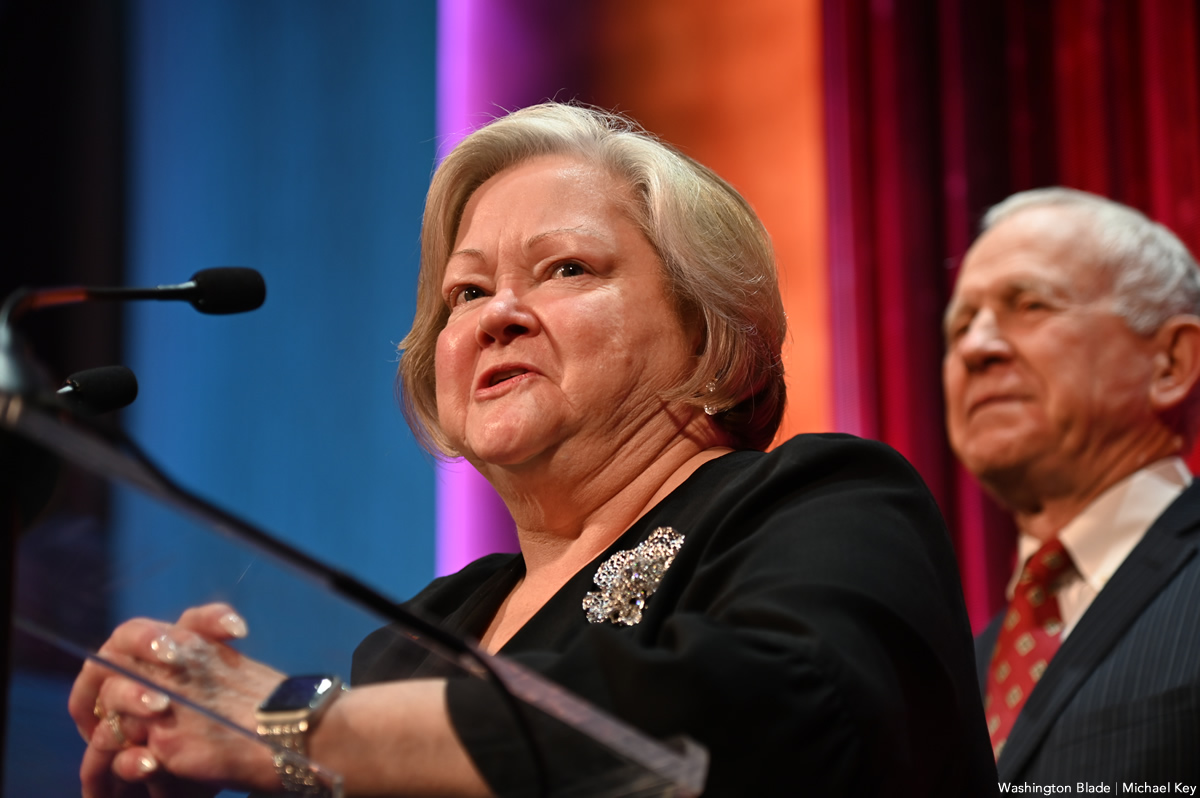
Beloved LGBTQ advocate Judy Shepard is among the 19 honorees who will receive the Presidential Medal of Freedom, the highest civilian award in the U.S., the White House announced on Friday.
The mother of Matthew Shepard, who was killed in 1998 in the country’s most notorious anti-gay hate crime, she co-founded the Matthew Shepard Foundation with her husband Dennis to raise awareness about anti-LGBTQ violence.
The organization runs education, outreach, and advocacy programs, many focused on schools.
In a statement shared via the Human Rights Campaign, Shepard said, “This unexpected honor has been very humbling for me, Dennis, and our family. What makes us proud is knowing our President and our nation share our lifelong commitment to making this world a safer, more loving, more respectful, and more peaceful place for everyone.
“I am grateful to everyone whose love and support for our work through the years has sustained me.
“If I had the power to change one thing, I can only dream of the example that Matt’s life and purpose would have shown, had he lived. This honor reminds the world that his life, and every life, is precious.”
Shepard was instrumental in working with then-President Barack Obama for passage of the landmark Matthew Shepard and James Byrd Jr. Hate Crimes Prevention Act in 2009, which was led in the House by then-Speaker Nancy Pelosi (D-Calif.), who will also be honored with a Presidential Medal of Freedom during the ceremony on Friday.
Also in 2009, Shepard published a memoir, “The Meaning of Matthew: My Son’s Murder in Laramie, and a World Transformed,” and was honored with the Black Tie Dinner Elizabeth Birch Equality Award.
“Judy Shepard has been a champion for equality and President Biden’s choice to honor her with the Presidential Medal of Freedom is a testament to what she’s done to be a force of good in the world,” HRC President Kelley Robinson said in a statement.
“A mother who turned unspeakable grief over the loss of her son into a decades-long fight against anti-LGBTQ+ hatred and violence, Judy continues to make a lasting impact in the lives of the LGBTQ+ community,” she said.
“It is because of her advocacy that the first federal hate crimes legislation became law and that countless life-saving trainings, resources and conversations about equality and acceptance are provided each year by the Matthew Shepard Foundation,” Robinson said. “We are honored that Judy is a member of the HRC family and know that her work to create a more inclusive and just world will only continue.”
Other awardees who will be honored by the White House this year are: Actor Michelle Yeoh, entrepreneur and former New York Mayor Michael Bloomberg, Jesuit Catholic priest Gregory Boyle, Assistant House Democratic Leader Jim Clyburn (D-S.C.), former Labor and Education Secretary and former U.S. Sen. Elizabeth Dole (R-N.C.), journalist and former daytime talkshow host Phil Donahue, World War II veteran and civil rights activist Medgar Evers (posthumous), former Vice President Al Gore, civil rights activist and lawyer Clarence B. Jones, former Secretary of State and U.S. Sen. John Kerry (D-Mass.), former U.S. Sen. Frank Lautenberg (D-N.J.) (posthumous), Olympic swimmer Katie Ledecky, educator and activist Opal Lee, astronaut and former director of NASA’s Johnson Space Center Ellen Ochoa, astronomer Jane Rigby, United Farm Workers President Teresa Romero, and Olympic athlete Jim Thorpe (posthumous).

